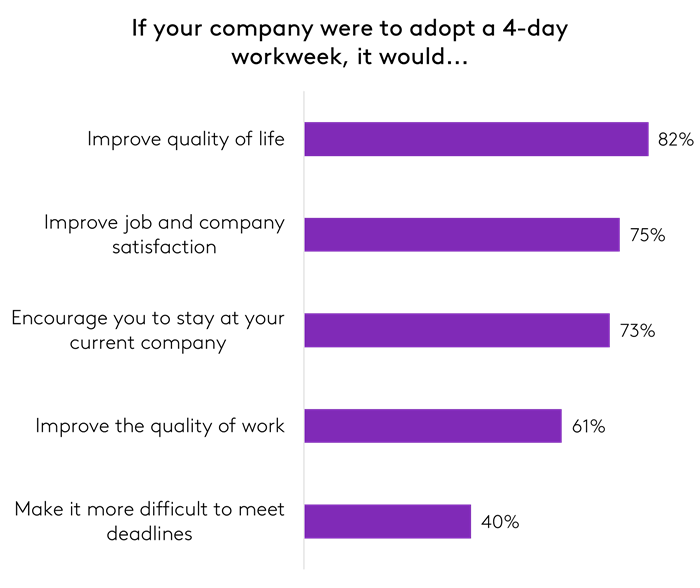Kantar has recently conducted research into the sentiments, experiences, and behaviors of workers in the UK and nine other markets as they navigate a shifting workplace. Continue reading to learn more about how UK workers feel about a shorter 4-day workweek, hybrid working environments and policies, workplace surveillance, job security, and the meaning of work.
UK workers share positive views on 4-day workweek
Currently, 69% of full-time UK employees work an average of 5 days a week, but our study finds that over half (54%) believe their job could be done in fewer than 5 days. Additionally, 75% of UK workers said their job and company satisfaction would improve with a 4-day workweek, while 40% are concerned that it might stretch the time required to meet project deadlines.When asked if they would be motivated to apply for jobs at companies that offer a 4-day workweek, 57% of the UK workforce responded positively.

Most UK workers are hybrid now and prefer to keep flexibility
Although the UK has fully reopened its workplaces, hybrid working is still prevalent. Currently, the majority of workers in the UK are either remote or hybrid, with 44% working in a hybrid model and 34% working entirely remotely. Despite the expectation that workers would return to the office more frequently, only 17% say they spent less time working remotely over the past year. In fact, 28% work remotely more frequently, with reasons including saving time on commuting (35%) and being more productive at home (27%).
Overall, most UK employees are content with their employer's remote work policy (79%). However, 45% of them admit that they would consider seeking new employment if they were not granted flexibility. In addition to flexibility, hybrid workers in the UK want their employers to prioritize benefits to maintain home offices (34%) and employee growth (32%).
As more RTO, some UK hybrid workers are changing their purchasing behaviours and redefining physical workplace
As UK workers spend more time now in the office (the majority still reporting to working a hybrid schedule), 18% of UK workers shop in-store before or after work more than they did last year. Meanwhile, online shopping remains popular, with 34% of workers shopping online more now than they did a year ago.
However, economic uncertainty may have made some workers more cautious about their spending, with 1 in 5 UK workers buying coffee and lunch less frequently than they did a year ago.
UK workers shop compared to last year
18%
Shop in-store during breaks more
20%
Purchase coffee less
18%
Shop in-store before or after work more
24%
Purchase lunch less
34%
Shop online more
After spending two or more years working from their home offices, many people have had a shift in their perceptions of physical office spaces. In fact, 27% of UK workers who prefer to work remotely have reported that they feel more productive when working from home due to fewer interruptions from colleagues and a more comfortable work environment.
For those UK workers who have a hybrid or onsite work arrangement, their top priority is having access to a quiet space where they can focus on their work (63%). Following this, their second priority is having access to a quiet space where they can participate in virtual meetings (42%).

UK workers are cutting their spending in response to economic uncertainty
Globally, nearly half of workers (47%) are concerned that their company may need to cut costs and lay off employees this year. Compared to the global average, only 34% of UK workers express concern about the possibility of layoffs this year.
15% of UK workers are currently worried about their job security, indicating that the majority of workers in the UK feel relatively secure in their current employment.

Even though most UK workers are relatively less worried about job security than workers in other markets, many are taking proactive steps to combat the economic downturn. More than half of the population is reducing their spending, while 24% of UK workers are pursuing multiple income streams. In fact, 23% of people in the UK have at least one side job, with 55% doing so to bring in extra money.
“New challenges” and “human connections” make work meaningful to UK workers
Many companies are using workplace surveillance apps ("bossware") to monitor employee productivity as remote working continues to become a fixture in the workforce today. In the UK, where 78% of workers are currently remote or hybrid, 28% of them report that their employers use such software to track their performance. However, opinions on the implementation of bossware are mixed, with 25% of workers feeling motivated to stay on task while another 25% feel that their employer does not trust them and that they are being constantly monitored.
UK workers appear less likely than those in other surveyed countries to consider switching jobs with 28% actively interviewing compared to 35% globally are actively interviewing for a new job. However, it is still important for companies to understand what these workers value in order to cultivate a positive company culture. For UK workers, 43% of them find "new challenges" to be a key factor in making their work meaningful, followed by the ability to "create opportunities and build relationships and connections".

Get more answers
For more findings from this study, access the complete Community Report: Connecting with the Workforce. Find additional generational and country-specific answers on sentiments toward new ways of working, economic pressures and more.
About this study
This research was conducted online among 10,055 full or part-time workers (whose job function could be performed remotely at least part-time) across ten global markets: US, UK, France, Germany, India, Singapore, Spain, South Africa, Mainland China and Brazil between December 13, 2022 - January 6, 2023. All interviews were conducted as online self-completion and collected based on controlled quotas evenly distributed between generations and gender by country.
Respondents were sourced from the Kantar Profiles Audience Network.
